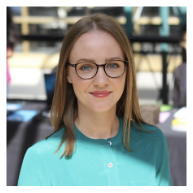Scholarly Communications and Copyright Services Librarian, University of British Columbia

Please tell us a bit about yourself (e.g. hometown, current locale, course of study).
While I have traveled around for work and school, I started out life on the West Coast and am still there today, working in Vancouver, Canada. Before getting my Master’s in Library and Information Studies, I earned a bachelor’s and Master’s of Arts in English Literature.
Describe some of your current responsibilities, and what type of organization you belong to.
Currently, I work at the University of British Columbia and specialize in copyright and scholarly communications. In this dual role, I educate the university community on institutional copyright policies and their rights and obligations both as users and creators of copyrighted works. I also spread awareness about emerging publishing models and talk to researchers about how they can make their work openly accessible and comply with funder open access mandates. Additionally, I am the technical administrator for our institutional Open Journal Systems installation.
What was your first scholarly publishing role? How did you get that job? What path led to your current position?
I have always been involved with scholarly publishing from the academic library side. I started as a Student Librarian in the office I am now currently employed in. In my student role, I was introduced to the contemporary publishing ecosystem and quickly realized that this was a very interesting field to work in. The experience I gained as a student was enough to help me secure my first professional Librarian role as a Copyright and Scholarly Communications Librarian at the University of Winnipeg. After a one-year term appointment in Winnipeg, I applied for my current position. Again, the experience I had as a student employee in the office previously, paired with a year of professional experience, made me a good fit for the role. I feel very lucky that I cultivated relevant experience as a student because I don’t think I would be where I am today without it.
If there was a pivotal moment or key person in your career development, please describe briefly.
While a student, taking my Master’s in Library and Information Studies, the Copyright and Scholarly Communications Librarian working at my institution came to speak to my class about the current copyright landscape. Previous to his visit, I wasn’t even aware that librarians were engaging in copyright education at all, nor did I realize how dynamic the field was. Based on his visit to our class I applied for a student position in his Office and my experience there further solidified my interest in the field. Without that initial introduction to copyright, I doubt I would have considered copyright a possible career specialization.
What tools, websites, and organizations do you find most valuable for your career development?
I think that general current awareness is so important in my field, so I try to stay up-to-date on the latest news and research related to both copyright and scholarly communications. I do this by subscribing to listservs ( e.g. the Association of College and Research Libraries ScholComm Listserv), reading relevant journal literature (e.g. Journal of Librarianship and Scholarly Communication and the Idealis), following the conversations on Twitter, and, of course, reading The Scholarly Kitchen.
What are some of the surprises/obstacles that you’ve encountered during your career?
As an early-career professional my biggest obstacle is developing sufficient expertise in my field. Both copyright and scholarly communications are specializations that aren’t comprehensively taught in Library Studies programs. I have had to be very proactive in my own professional development.
What do you wish you knew more about?
Hmmmm…lots of things! Currently, I would love to know how I can be a better advocate for the transition to open access on my campus. You don’t learn how to advocate for change effectively in graduate school.
What advice would you give to people interested in a career in scholarly communications?
I would suggest trying to get experience while still a student. I find that it can be difficult to break into the field without some basic knowledge. In my Master’s program, there were many professional experience opportunities and I took advantage of many of them. Not only were these experiences valuable, but they were also less competitive than what awaits in the open job market. I was able to get unique opportunities as a student that I would be unlikely to get as a job applicant.

